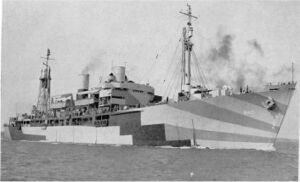USS Artemis (AKA-21)
 USS Artemis (AKA-21) USS Artemis (AKA-21) | |
| History | |
|---|---|
| Laid down: | 23 November 1943 |
| Launched: | 20 May 1944 |
| Commissioned: | 28 August 1944 |
| Decommissioned: | 10 January 1947 |
| Struck: | 25 February 1947 |
| Fate: | Sold for scrap in the 1960's |
| General Characteristics | |
| Builder: | Walsh-Kaiser Co., Inc. |
| Hull type: | S4-SE2-BE1 |
| Displacement: | 4,087 tons light, 7,080 tons loaded |
| Length: | 426 ft (129.8 m) |
| Beam: | 58 ft (17.7 m) |
| Draft: | 16 ft (4.9 m) |
| Propulsion: | Steam turbo-electric drive; two boilers, two propellers, 6,000 shp (4.5 MW) |
| Speed: | 16.9 knots (31.3 km/h) |
| Complement: | 321 (20 officers, 301 men), plus 255 embarked troops |
| Armament: | 1 × 5"/38 caliber DP gun, 4 × twin 40 mm AA guns, 16 × 20 mm AA guns |
| Boats: | 14 LCVP, 8 LCM |
USS Artemis (AKA-21) was an Artemis class attack cargo ship named after the asteroid 105 Artemis, which in turn was named after the Greek goddess Artemis. She served as a commissioned ship for 2 years and 4 months, earning two battle stars for her World War II service.
1943-1944
Artemis (AKA-21) was laid down under a Maritime Commission contract (MC hull 1882) on November 23, 1943, by the Walsh-Kaiser Co., Inc.; launched on May 20, 1944 and commissioned that same day, LCDR Thomas J. Rattray in command.
After fitting out at Boston, Mass., the attack cargo ship proceeded to the Chesapeake Bay for shakedown training. She then sailed to the naval supply depot at Bayonne, N.J., to embark naval passengers and supplies for transportation to the U.S. Pacific Command. The ship got underway on October 12, and transited the Panama Canal on the 17th. On that same date, she reported to Amphibious Forces, Pacific Fleet, and continued on to San Diego, Calif., on the 26th and remained in port for one day. The vessel then shaped a course for Hawaii.
Artemis reached Pearl Harbor on 3 November and unloaded her passengers. One day later, she left Hawaiian waters to return to California. While in Hawaii, she participated in a series of training exercises held off Pearl Harbor.
1945
On January 4, 1945, she proceeded to Kahalui, Maui, to embark marines. The vessel got underway on January 12 with units of Task Force (TF) 51 for amphibious training exercises off Maui and arrived back at Pearl Harbor on the 18th.
After spending two days at Eniwetok Atoll, Artemis got underway to participate in the Battle of Iwo Jimas. Steaming via Saipan, the ship anchored in Transport Area "Baker" off the southeast coast of Iwo Jima on February 19. She then sent her boats to assist the transports during the initial assault. The attack cargo ship remained in the area through the 27th discharging troops and cargo and taking casualties on board during the day and retiring out to sea each night.
Returning to Saipan, she then went to the flet base at Ulithi. and then left for the Philippines, in general support of Pacific logistics. Drydocked at Pearl Harbor at the time of the Japanese surrender, she participated in moving occupation troops to Japan.
1946 onward
Upon her arrival at Pearl Harbor, she supported operations there until, when she was assigned to Joint Task Force 1 to support Operation "Crossroads," tests conductd at Bikini Atoll to learn of the effects of atomic bomb explosions upon warships. This assignment occupied the cargo ship through mid-August when she returned to Pearl Harbor and resumed local operations.
After retransiting the canal, the ship continued on to Naval Station Norfolk Virginia, where she was decommissioned in 1947, and eventually scrapped.
References
- Dictionary of American Naval Fighting Ships (Primary source for this article)